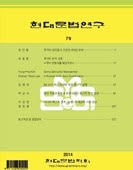학술논문
How Do Korean EFL Learners Acquire English Modal Auxiliaries Can, Could, May, and Might?:
이용수 121
- 영문명
- 발행기관
- 현대문법학회
- 저자명
- In cheol Choi
- 간행물 정보
- 『현대문법연구』제92호, 233~248쪽, 전체 16쪽
- 주제분류
- 인문학 > 언어학
- 파일형태
- 발행일자
- 2017.01.01

국문 초록
영문 초록
By comparing a corpus of Korean learners of English with a native speaker corpus, this study shows to what extent and in what ways Korean learners acquire English modal verbs can, could, may, and might (Hunston 2002). This corpus study revealed that the Korean learners underused could, may, and might. Two factors can explain the pattern of the Korean learners’ acquisition of the 4 modal verbs. First, the difficulty of combining tense with the modal verbs impedes the learners’ preterit form use of the modal verbs. Second, the epistemic modality is acquired much later than the root modality such as possibility, permission, and ability (Gibbs 1990). Since may and might typically associate with the epistemic modality, the learners rarely used those modal verbs.
목차
1. Introduction
2. Modal Verbs in the Acquisitin Literature
3. Method
4. Results
5. Discussion
6. Conclusion
References
해당간행물 수록 논문
참고문헌
최근 이용한 논문
교보eBook 첫 방문을 환영 합니다!

신규가입 혜택 지급이 완료 되었습니다.
바로 사용 가능한 교보e캐시 1,000원 (유효기간 7일)
지금 바로 교보eBook의 다양한 콘텐츠를 이용해 보세요!


